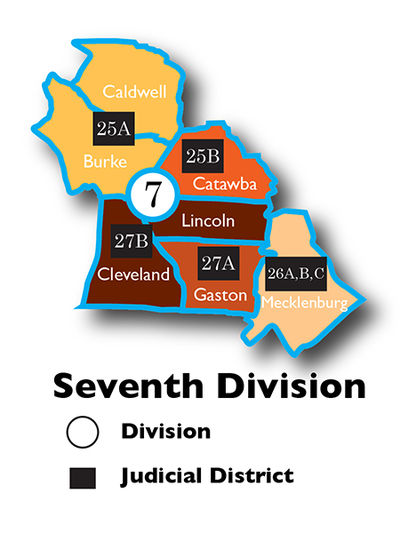Seventh Division of the Superior Court, North Carolina (decommissioned)
Court
The Seventh Division of the North Carolina Superior Court is a former superior court division that was redistributed in 2019 following the North Carolina General Assembly's passage of House Bill 717.[1] The Seventh Division encompassed five districts and seven counties. This page reflects the districts and counties in the Seventh Division prior to 2019.
Judicial districts
Counties in the Seventh Division
Court restructuring
2018
Changes
In 2018, the North Carolina General Assembly passed House Bill 717, revising the state superior court, district court, and prosecutorial districts. The table below highlights the changes the bill made.[2]
| Changes to North Carolina superior and district courts | |
|---|---|
| Court | Changes |
| Superior court | Decreased superior court judicial divisions from eight to five Created superior court districts Increased the number of superior court judges from 92 to 99 |
| District court | Redistributed the district courts across counties Increased the number of district court judges by one |
Timeline
Below is a brief timeline of the bill:
- June 28, 2018:
- House Bill (HB) 717 became session law 2018-121.
- The North Carolina State Senate overrode the governor's veto, 30-16.
- June 27, 2018: The North Carolina House of Representatives overrode the governor's veto, 75-45.
- June 25, 2018: Gov. Roy Cooper (D) vetoed the legislation.
- June 6, 2018: The state Senate approved HB 717.
- October 5, 2017: The state House passed HB 717.[3]
Elections
- See also: North Carolina judicial elections
North Carolina is one of 43 states that hold elections for judicial positions. To learn more about judicial selection in North Carolina, click here.
- North Carolina local trial court judicial elections, 2026
- North Carolina local trial court judicial elections, 2025
- North Carolina local trial court judicial elections, 2024
- North Carolina local trial court judicial elections, 2023
- North Carolina local trial court judicial elections, 2022
- North Carolina local trial court judicial elections, 2021
- North Carolina local trial court judicial elections, 2020
- North Carolina local trial court judicial elections, 2019
- North Carolina local trial court judicial elections, 2018
- North Carolina local trial court judicial elections, 2017
- North Carolina local trial court judicial elections, 2016
- North Carolina judicial elections, 2014
- North Carolina judicial elections, 2012
- North Carolina judicial elections, 2010
Selection method
- See also: Partisan election of judges
The 98 judges of the North Carolina Superior Courts are chosen in partisan elections to serve eight-year terms. From 1998 through 2016, elections for superior court judges were nonpartisan; however, on March 23, 2017, the North Carolina legislature changed the method of election to partisan elections by overriding Gov. Roy Cooper's veto of HB 100. This change was effective with the 2018 superior court elections.[4][5][6][7][8]
The chief judge of each superior court is chosen by seniority.[9]
Qualifications
To serve on a superior court, a judge must be:
Election rules
Primary election
The judges of the North Carolina Superior Courts are chosen through partisan elections. Judges are elected to eight-year terms and must face re-election if they wish to serve again.[10]
The judges of the North Carolina District Courts are chosen through partisan elections. District judges serve four-year terms, after which they must run for re-election if they wish to remain on the court.[11][10]
See also
External links
- Search Google News for this topic
- North Carolina Judicial Branch
- North Carolina Superior Court
- North Carolina Judicial Branch Directory Search
- North Carolina court structure from the Court Statistics Project
Footnotes
- ↑ North Carolina General Assembly, "Session Law 2018-121, House Bill 717," accessed August 30, 2019
- ↑ North Carolina General Assembly, "Session Law 2018-121, House Bill 717," accessed August 30, 2019
- ↑ North Carolina General Assembly, "House Bill 717 / SL 2018-121," accessed August 30, 2019
- ↑ American Judicature Society, "Methods of Judicial Selection: North Carolina," archived October 3, 2014
- ↑ General Assembly of North Carolina, "Session Law 2015-292: House Bill 8," October 29, 2015
- ↑ The News & Observer, "Veto override means voters will know judges’ party affiliations," March 23, 2017
- ↑ General Assembly of North Carolina, "House Bill 100," accessed May 5, 2017
- ↑ North Carolina General Assembly, "Session Law 2018-121, House Bill 717," accessed August 30, 2019
- ↑ 9.0 9.1 Cite error: Invalid
<ref>tag; no text was provided for refs namedgeneral - ↑ 10.0 10.1 The University of North Carolina at Chapel Hill | School of Government, "History of North Carolina Judicial Elections," August 2020
- ↑ North Carolina General Assembly, "North Carolina Constitution - Article IV," accessed September 20, 2021 (Section 19)







